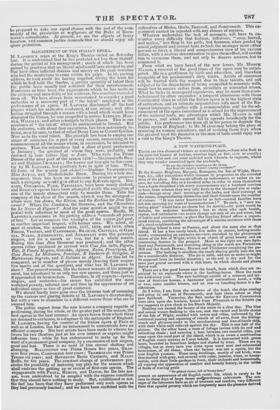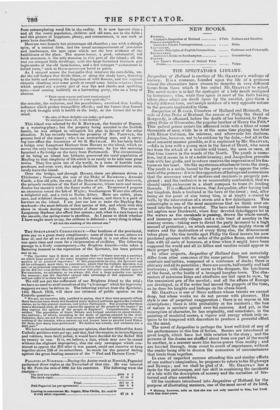In January ; the greatest of whom they were, probably,
not THERE are two classes of visitors at watering-places,—those who flock to destined to hear before May or June. Who were the Prime the crowded haunts of fashion. whether high or low, civic or courtly; Donne of the most part of the season 1830 ?--Mademoiselle BLA- and those who seek out some secluded nook wherein to vegetate, where sir and Madame FE MAMA ; the former not brought to this coon- they may wander unnoticed upon the sea-beach, into a house furnished with every inconvenience and a hundred crevices and Rossixes operas have been attempted (with the exception of to boot, from whence they may sally forth to the thronged pier or espla- one of the female characters) only to murder them. Take his nade—lounge away their mornings at the baths, and their evenings at company at the close of the season, when it was the strongest— the rooms, congratulating themselves and their friends upon the number where were the Anna, the Elvira, and the Zerlina for Don Gio- of visitors. " It was never known to be so full—several families have vanni 7 Where the Contessa, the Susanna, and the Cherubim) left this morning for want of accommodation ! " To such, a " new wa- for Le Nozze di Figaro 1' And the same question might he re- tering-place" would have no charm but its novelty—its quiet would be pealed with reference to most of the great operas. Really, M. dulness, its seclusion loneliness : but to those who seek health, LAPORTE'S assurance in his parting address " exceeds all power repose, and retirement—an entire change not only of air and scene, but of face." Let us compare the triumphs of the season just past, of habits and amusements—a place like Hayling Island offers a segues.. in another important respect, with former ones. We select, al- tered retreat, combining the advantages df a marine residence with those most at random, the seasons 1816, 1817, 1818, and 1819, when of a rural neighbourhood.
There are a few good houses near the beach, from which they. are se-
from contemplating rural life in the reality. It is now harvest time ; and all the rustic population, children and old men, are in the fields ; and this picture of happiness, plenty, and contentment, is one such as poets have described.
Hereare two homely but picturesque old churches ; one with a shingle spire, of a conical form, and the usual accompaniments of yew-trees and tombstones, the ages upon which are the best evidence of the healthiness of the place. The manor-house, a good, substantial, red brick structure, is the only mansion in this part of the island ; all the rest are compact little dwellings, with the large furnished kitchens and ingle-nooks of the old farm-houses, and a few cottages " embosomed in tufted trees," such as GAINSBOROUGH loved to paint.
As I strayed across the foot-paths that intersect the corn-fields, un- der the tall hedges that divide them, or along the shady lanes, listening to the birds and scenting the fragrance of wild flowers, and the vagrant clematis climbing over some porch or round some lattice-window, frinn which peeped out a pretty pair of rosy lips and cheeks and sparkling eyes,—now coming suddenly on a harvesting party, who on a heap of sheaves " Their sweet repose and lated meal enjoyed Beneath the shadow of some aged oak, '— the serenity, the seclusion, and the peacefulness, exercised that healing influence which perfect tranquillity affords ; and the breeze that fanned my cheek brought with it health to the body, as the former did to the mind.
" He who of these delights can judge, and spare, To interpose theM oft, is not unwise."
This island was selected by Sir R. HOT HAM, the founder of Bognor, as a watering-place ; but the property being entailed in the Norfolk family, he was obliged to relinquish his plan in favour of the other situation. It has recently become the property of Mr. PADWICK, the present lord of the manor; who is an enterprising man, and is carry- ing into effect the intentions of Sir R. H.0THAM. He has lately built a bridge over Langstone Harbour from Havant to the island, which re- moves the only insular inconvenience : moreover, he has this morning launched a fly-bridge on the ferry from Portsmouth. The circumstance of its being an island has hitherto preserved the rural population of Hayling in that simplicity of life which is so rarely to be seen near great towns. They live quite out of the world, in a state of humble inde- pendence, and even now, that ample facilities for communication exist, rarely leave the island. Over the bridge, and through Havant, there are pleasant drives to Chichester ; Goodwood, the seat of the Duke of RICHMOND; Arundel Castle, a fine old pile, the seat of the Duke of NORFOLK ; and Petworth, the princely residence of the Earl of EGREMONT, whose taste and muni- ficence has stored it with the finest works of art. To-morrow I propose an excursion round the Isle of Wight ; Southampton Water also affords a delightful sail, and a visit to Netley Abbey. Here are rabbit, phea- sant, and wildfowl shooting, each in their season, and there is a pack of barriers on the island. I am just too late to taste the Hayling Bay mackarel—the most delicate of that species of fish, and which visit this shore in shoals during the months of June and July. The coves of Langstone Harbour also afford fine oysters ; and, what is a rare luxury at the sea-side, the spring-water is excellent. As I pause to think whether I have aught more to say, the stillness is delicious : every thing is silent " All but the washing of the eternal sea."



























 Previous page
Previous page